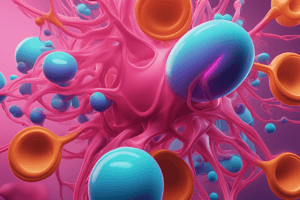Podcast
Questions and Answers
Which process involves the production of secondary oocytes in females?
Which process involves the production of secondary oocytes in females?
- Ovulation
- Spermatogenesis
- Gametogenesis (correct)
- Egg fertilization
Where does sperm production begin in males?
Where does sperm production begin in males?
- Fallopian tube
- Testes (correct)
- Ovaries
- Epididymis
What is the term for the process where one secondary oocyte is released into the fallopian tube?
What is the term for the process where one secondary oocyte is released into the fallopian tube?
- Spermatogenesis
- Egg fertilization
- Gametogenesis
- Ovulation (correct)
Which factor is NOT involved in influencing reproductive health?
Which factor is NOT involved in influencing reproductive health?
What is the process that involves sperm transport and egg fertilization?
What is the process that involves sperm transport and egg fertilization?
Which term refers to a state of complete physical, mental, and social well-being related to reproductive abilities?
Which term refers to a state of complete physical, mental, and social well-being related to reproductive abilities?
What is the main purpose of sexual reproduction in species?
What is the main purpose of sexual reproduction in species?
Which of the following is NOT a part of the female human reproductive system?
Which of the following is NOT a part of the female human reproductive system?
In human reproduction, where does fertilization typically occur?
In human reproduction, where does fertilization typically occur?
What is the primary function of the male gamete in fertilization?
What is the primary function of the male gamete in fertilization?
Which organ in the male reproductive system is responsible for storing and maturing sperm cells?
Which organ in the male reproductive system is responsible for storing and maturing sperm cells?
Why is genetic diversity important in populations?
Why is genetic diversity important in populations?
Flashcards are hidden until you start studying
Study Notes
Understanding Reproduction: Exploring Sexual Reproduction, Human Reproductive System, and Fertilization
Reproduction is a wondrous process that sustains life on our planet, and it involves more than simply creating offspring. It's a complex interaction between biological systems that ensures the continuation of species. In this discussion, we'll focus on sexual reproduction, the human reproductive system, fertilization, and reproductive health.
Sexual Reproduction
Sexual reproduction is a process where two genetically unique individuals of the same species combine their genetic material to create a new organism. This process leads to a high level of genetic diversity within populations, which is crucial for species survival.
Human Reproductive System
The human reproductive system consists of organs and structures responsible for the production and transfer of genetic material, fertilization, and the nurturing of offspring. The female reproductive system includes the ovaries, fallopian tubes, uterus, and vagina, while the male reproductive system consists of the testes, epididymis, vas deferens, and penis.
Fertilization
Fertilization, or the fusion of gametes (egg and sperm), is the central event in sexual reproduction. It results in a zygote, which contains a unique combination of genetic material from both parents. The process of fertilization involves several stages, including spermatogenesis (sperm production) and ovulation (egg release), as well as sperm transport and egg fertilization.
Gametogenesis
Gametogenesis is the process by which gametes (egg and sperm cells) are produced. In females, the ovaries produce ova, or eggs, which undergo meiosis to form secondary oocytes. Ovulation occurs when one secondary oocyte is released into the fallopian tube. In males, sperm production begins in the testes and proceeds through several stages of maturation in the epididymis before being ejaculated.
Reproductive Health
Reproductive health refers to a state of complete physical, mental, and social well-being in relation to reproductive abilities, and it includes the ability to have a satisfying and safe sex life, as well as the capacity to reproduce and the freedom to decide if, when, and how often to do so.
Reproductive health is influenced by a variety of factors, including genetics, hormonal balance, and environmental factors such as nutrition, sexual health education, and access to reproductive health services.
In conclusion, reproduction is a fundamental process that sustains life, and the specifics of sexual reproduction, the human reproductive system, fertilization, and gametogenesis play essential roles in the continuation of species. As we learn more about reproductive health, we gain a deeper understanding of the factors that influence it and can use this knowledge to improve our reproductive well-being and the well-being of our planet.
Studying That Suits You
Use AI to generate personalized quizzes and flashcards to suit your learning preferences.




